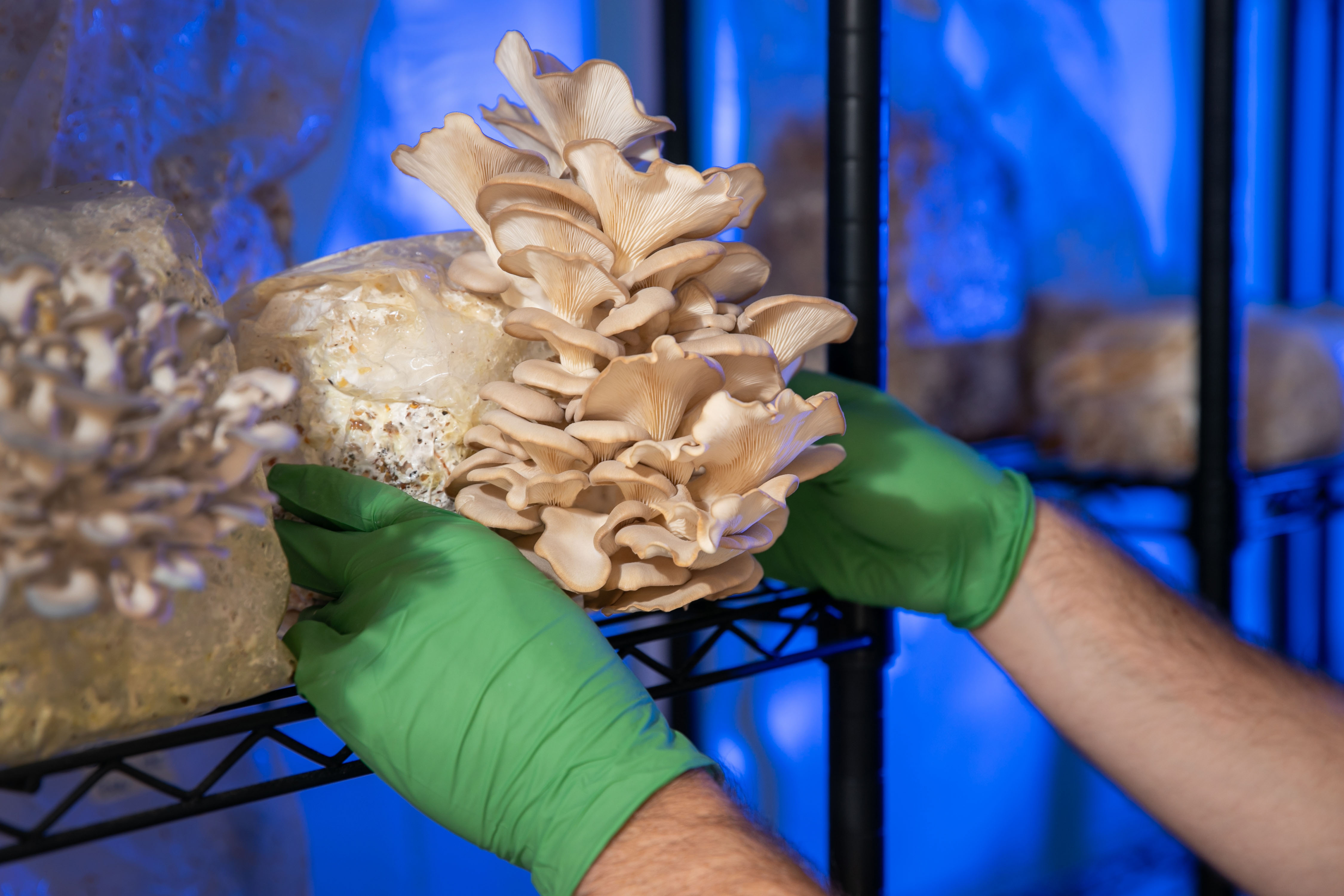Think of a climate that produces little to no food. Did Antarctica or the desert cross your mind? Researchers at Kennesaw State University (KSU) have developed a way to grow a food—mushrooms—in the most unlikely of places, using shipping containers.
Using grants from the Georgia Department of Agriculture, Georgia Research Alliance, and Georgia Center of Innovation, KSU researchers Christopher Cornelison and Kyle Gabriel are growing mushrooms in environmentally controlled shipping containers, which shortens the supply chain and puts these tasty and nutritious foods on tables faster than ever.
Mushrooms are already popular in kitchens worldwide, with the U.S. Department of Agriculture reporting that the U.S. market for culinary mushrooms includes 702 million pounds of production worth $1.02 billion annually. However, these nutrient-rich fungi are underappreciated in domestic agriculture, where 50% of the mushrooms consumed in the US are grown abroad.
Cornelison, Assistant Vice President for Innovation and Commercialization and Director of Intellectual Property Development at KSU, emphasizes the need for new agricultural practices to meet the demands of a growing global population. “We must be able to develop sustainable methods for producing readily preservable and nutritious foods without regional climactic limitations,” he said.
“Mushrooms provide unique nutritional, medicinal, and economic benefits, yet their demand still exceeds their supply.” Kyle Gabriel
To address this gap, the two joined together on a project with one goal in mind: to create a semi-automated mushroom production facility that could be set up in almost any environment, even urban areas. The initial prototype, housed in a shipping container at the KSU Field Station, relies on an environmental control system designed by Gabriel. Three additional prototype units are now deployed with commercial growers in Georgia as part of a pilot study to validate the performance of the technology and inform the economic benefits that growers see from this approach to growing specialty mushrooms.
The system, powered by the software Mycodo, autonomously regulates humidity, temperature, and carbon dioxide levels to optimize mushroom growth. Gabriel’s mushroom cultivation system actually predates his time as a research scientist. In his undergraduate years, he created a basic cultivation chamber in his closet, where he used self-designed hardware and software to automate the growth process. “I am a firm believer in utilizing technology to improve quality of life, especially when it can result in fresher products locally sold, thereby reducing the carbon footprint of packaging and transportation,” he notes.
Cornelison and Gabriel’s research extends to identifying mushroom varieties that are not only palatable but also thrive in the controlled environment of their system. By testing strains foraged in Georgia and commercially available varieties not typically grown in the state, they aim to discover strains that could be grown locally on agricultural waste, thereby enhancing sustainability and expanding the portfolio of culinary mushrooms available to growers.

Food sustainability isn’t just about where our food comes from, it can also be about what we do with what’s left behind. That’s the kind of innovative thinking of graduate students in the BioInnovation Laboratory including alumni Daniel Rhiner and Will Beeson. Rhiner and Beeson reached out to Cornelison and Gabriel after learning about the mushroom cultivation project and were subsequently accepted into the integrative biology master’s degree program at KSU. Both have now graduated from the program after contributing substantially to the technology’s development.
Rhiner’s thesis revolved around repurposing low-value agricultural waste as growth substrates for mushrooms, specifically oyster mushrooms, the second most widely cultivated mushroom in the world. “The sustainability movement was very intriguing to me,” Rhiner said, “and I started to explore growing my own food at home, including mushrooms.”
Rhiner’s work laid the foundation for KSU’s exploration of using local agricultural waste like peanut shells, corn chaff, and spent brewing grains as substrates for mushroom production. This approach not only promotes sustainability but also holds the potential to increase mushroom profitability by reducing reliance on imported substrates.
Cornelison has received $150,000 in grants from the Georgia Research Alliance (GRA) to continue the development of the project’s commercial feasibility. “Georgia has the resources to compete in this market with the appropriate application of technology and coordination of resources,” he said.
KSU was also one of just two institutions to be invited to participate in the inaugural cohort of the Greater Yield initiative, launched by Lee Herron, GRA’s vice president of venture development in 2020. The Greater Yield initiative’s primary objective is to support university start-up companies focused on agricultural and food technology.
Following the completion of Greater Yield, Cornelison and Gabriel founded MycoLogic Inc. and licensed the technology from the KSU Research and Service Foundation (KSURSF) in order to advance the technology into commercial production. This venture, currently a resident of KSU’s HatchBridge Incubator, is creating jobs, increasing the availability of nutritious food, and reducing the environmental impact of food transport, all while recapturing agricultural waste streams.
“Participating in the Greater Yield accelerator program was crucial to helping us identify our path forward,” Cornelison said. “This project and MycoLogic align with many of the priorities of the state of Georgia, and we are hopeful that our shared goals will continue to result in meaningful innovations that benefit our communities.”